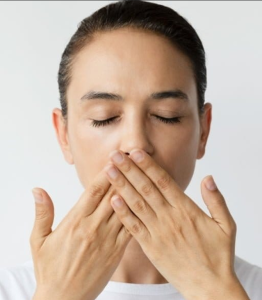Bad Breath Treatment
Contents
-
Bad Breath Treatment
-
What is Bad Breath and Why Does It Occur?
-
Effective Methods for Bad Breath Treatment
-
The Importance of Dental Check-ups
-
Alternative Treatment Methods for Bad Breath
-
Peppermint and Thyme Oil
-
Apple Cider Vinegar
-
Chewing Gum
-
The Relationship Between Bad Breath and Overall Health
Bad breath treatment, medically known as “halitosis,” refers to an unpleasant odor emanating from the mouth. This condition can cause discomfort in social interactions and negatively affect a person’s self-confidence. The most common causes of bad breath include poor oral hygiene, tooth decay, gum diseases, and reduced saliva production.
What is Bad Breath and Why Does It Occur?
Food particles trapped in the mouth can promote bacterial growth and lead to the formation of toxins responsible for foul odors. Additionally, dry mouth is another factor that increases bad breath. Saliva helps by cleansing bacteria and balancing the acidic environment in the mouth to prevent odor formation. Insufficient water intake, certain medications, or health conditions (such as diabetes or allergies) can affect saliva production. Moreover, digestive system problems, especially those related to the stomach and intestines, may also cause bad breath.
Effective Methods for Bad Breath Treatment
There are many ways to prevent and treat bad breath. First and foremost, maintaining oral hygiene is crucial. Brushing your teeth at least twice a day, using dental floss, and cleaning the tongue help reduce bacteria buildup. Using fluoride toothpaste prevents tooth decay and thereby combats bad breath.
Mouthwashes are also an effective method to reduce bad breath. Especially antiseptic mouthwashes can kill bacteria in the mouth, preventing odor formation. Drinking water is important to prevent dry mouth; therefore, consuming enough water increases saliva production and helps cleanse harmful bacteria in the mouth.
Diet also has a significant impact on bad breath. Foods and drinks such as garlic, onions, coffee, and alcohol can increase bad breath. After consuming these, drinking water and maintaining oral hygiene are important to reduce odor. Additionally, eating fibrous foods, fruits, and vegetables supports oral health and helps prevent bad odors.
The Importance of Dental Check-ups
Professional dental examinations are vital in bad breath treatment. Dentists can detect tooth decay or gum disease early, which are primary causes of bad breath. By applying necessary treatments, dentists help eliminate bad breath.
Dentists also provide accurate information about oral hygiene, helping patients develop effective personal care routines. If you suffer from bad breath, consulting a dentist is essential to identify the root cause and find appropriate treatment. Dentists may also recommend saliva stimulants or other treatments to address dry mouth if necessary.
In conclusion, bad breath is a common problem that negatively affects quality of life. By maintaining oral hygiene, adopting a healthy diet, and attending regular dental check-ups, it is possible to prevent bad breath. Giving due importance to oral health helps maintain a healthier life both physically and psychologically.
Alternative Treatment Methods for Bad Breath

Bad Breath Treatment
In addition to traditional methods, alternative treatments can be used to manage bad breath. These methods involve natural ingredients and typically have fewer side effects. Here are some effective alternatives:
Peppermint and Thyme Oil
Peppermint and thyme oils are natural antiseptics effective in eliminating bad breath. Peppermint leaves a fresh scent in the mouth, while thyme oil is known for its antibacterial properties. You can add a few drops of peppermint or thyme oil to a glass of water for gargling or brew a tea by steeping a teaspoon of peppermint leaves in water. These methods help reduce unpleasant odors in the mouth.
Apple Cider Vinegar
Apple cider vinegar is another natural solution that supports oral health and helps reduce bad breath. Its acidic nature inhibits bacterial growth. You can gargle by mixing a teaspoon of apple cider vinegar in a glass of water or drink this mixture before meals to support your digestive system. However, because of its acidity, excessive use should be avoided as it may damage tooth enamel.
Chewing Gum
Chewing sugar-free gum is an effective temporary method to reduce bad breath. Gum stimulates saliva production, which cleans bacteria in the mouth and creates a fresh breath sensation. Chewing sugar-free gum especially after meals supports oral health and prevents bad breath.
The Relationship Between Bad Breath and Overall Health
Bad breath can sometimes be a sign of more serious health issues. Chronic bad breath may indicate digestive problems, infections, or systemic diseases. For example, dry mouth and bad breath are common problems in diabetic patients. Kidney or liver diseases can also cause unpleasant odors from the mouth.
Therefore, if bad breath persists or worsens, it is important to consult a healthcare professional. Necessary tests can determine the root cause, and appropriate treatment can be recommended. Considering factors that affect oral health is also important for improving overall health.
Conclusion
Bad breath is a common issue many people face occasionally but is treatable. Maintaining oral hygiene, following a healthy diet, drinking sufficient water, and regular dental check-ups are the most effective ways to prevent bad breath. Additionally, natural and alternative treatment methods provide extra solutions for reducing bad breath. Giving importance to oral health will positively impact not only social relationships but also overall health. Remember, a healthy mouth is the first step to a healthy body.
Follow our Instagram account: mercurydent
